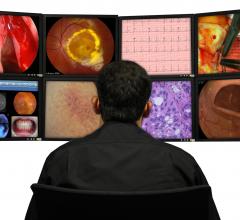If you enjoy this content, please share it with a colleague

Agfa Healthcare
RELATED CONTENT
If you would have asked radiologists about the future of radiology information systems (RIS) five to 10 years ago, there is a good chance that they would have told you that RIS was a dying technology. Because RIS systems were merging with other technological platforms, many radiologists did not expect the systems to be around. But now many physicians are trying to meet the Stage 2 meaningful use (MU) criteria to take advantage of Medicare and Medicaid incentive payments and prepare themselves to be in compliance when the criteria become requirements. RIS and picture archiving and communications systems (PACS) are experiencing a technological rebirth that will usher the next generation of these products smoothly into 2013.
Just a few years ago, the debate in radiology departments about workhorse X-ray systems was whether to convert from analog film to computed radiography (CR) cassettes and digital readers, or to direct imaging digital radiography (DR) systems. Today, there is no doubt DR has won that debate and is being widely adopted, and CR is falling out of favor.
Agfa HealthCare has introduced its global remote incident prevention (GRIP) services to provide state-of-the-art electronic monitoring of all IMPAX picture archiving and communication systems (PACS) worldwide, as well as linked devices from other suppliers. GRIP’s ultimate goal is to prevent unsettling downtime surprises in the healthcare environment.
Agfa HealthCare previewed version 2 of its Impax Business Intelligence solution to the U.S. market at the 98th annual meeting of the Radiological Society of North America in November 2012.
According to a new market research report "Breast Imaging Technologies Market (Digital Mammography,3D Breast Tomosynthesis, Breast MRI, Breast Ultrasound, Molecular Breast Imaging, Optical Imaging, PET/CT/PEM Modalities) Technology and Market Analysis & Global Forecasts to 2017" is an attempt to showcase the market impact of current and emerging breast imaging technologies having excellent growth potential in the coming five years. The technologies profiled in the report are segmented into Ionizing breast imaging modalities and Non-Ionizing breast imaging technologies on basis of radiation. Ionizing breast imaging modalities include Mammography, 3D Breast Tomosynthesis, Cone beam Computed Tomography (CBCT), Positron Emission Mammography (PEM), Molecular Breast Imaging (MBI), Positron Emission Tomography (PET) and Breast Specific Gamma Imaging (BSGI). The various Non-ionizing modalities for breast screening covered in the report are Breast MRI, Optical Imaging, Breast thermography and Breast Ultrasound.
Agfa HealthCare demonstrated its new Impax Radiation Exposure Monitoring (REM) solution at the 2012 RSNA meeting in Chicago. Impax REM provides an automated way to collect, organize and analyze a patient’s radiation exposure data. Radiation exposure is of interest to all players in a patient’s treatment, from the patient himself, to the referring physician, to the radiology department, to regulatory bodies and to researchers. Information on radiation exposure levels can support the referring physician in making a better-informed decision, while allowing the radiology department to use best practices and to conform to regulations, for example.
Agfa HealthCare has launched the IMPAX Data Center (IDC) 3.0. This new version of Agfa HealthCare’s enterprise medical imaging repository, also called a vendor neutral archive (VNA), is PACS- and storage vendor-agnostic.
Agfa HealthCare announced participation in the EMC Select program, enabling customers to purchase Agfa HealthCare's industry-leading ICIS solution through EMC Select. With the growing need to provide enterprise-wide access to all images, regardless of where created or stored, healthcare organizations can now leverage Agfa HealthCare's enterprise imaging and clinical workflow solutions with EMC Atmos, EMC Isilon, EMC VNX and EMC VMAX arrays.
December 17, 2012 — Agfa HealthCare announced the U.S. availability of its DX-D 400, a floor-mounted X-ray suite and the newest member of the company’s imaging portfolio. The DX-D 400 is both compact and versatile and can be configured to meet specific workflow needs or budget constraints.
Agfa HealthCare's Impax Business Intelligence is an advanced platform that enables healthcare managers and care providers to compile, organize and manage clinical, quality, financial and administrative data. A key benefit of Impax Business Intelligence is its ability to give managers and care providers access to data that helps them to identify opportunities such as trends and cost-savings, as well as potential issues like workflow bottlenecks.


 February 08, 2013
February 08, 2013 








